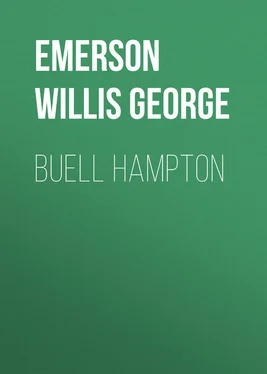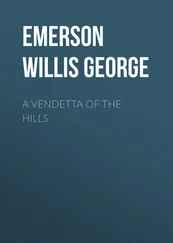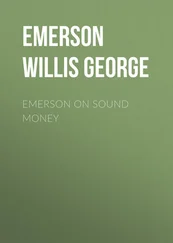Willis Emerson - Buell Hampton
Здесь есть возможность читать онлайн «Willis Emerson - Buell Hampton» — ознакомительный отрывок электронной книги совершенно бесплатно, а после прочтения отрывка купить полную версию. В некоторых случаях можно слушать аудио, скачать через торрент в формате fb2 и присутствует краткое содержание. Жанр: foreign_antique, foreign_prose, на английском языке. Описание произведения, (предисловие) а так же отзывы посетителей доступны на портале библиотеки ЛибКат.
- Название:Buell Hampton
- Автор:
- Жанр:
- Год:неизвестен
- ISBN:нет данных
- Рейтинг книги:5 / 5. Голосов: 1
-
Избранное:Добавить в избранное
- Отзывы:
-
Ваша оценка:
- 100
- 1
- 2
- 3
- 4
- 5
Buell Hampton: краткое содержание, описание и аннотация
Предлагаем к чтению аннотацию, описание, краткое содержание или предисловие (зависит от того, что написал сам автор книги «Buell Hampton»). Если вы не нашли необходимую информацию о книге — напишите в комментариях, мы постараемся отыскать её.
Buell Hampton — читать онлайн ознакомительный отрывок
Ниже представлен текст книги, разбитый по страницам. Система сохранения места последней прочитанной страницы, позволяет с удобством читать онлайн бесплатно книгу «Buell Hampton», без необходимости каждый раз заново искать на чём Вы остановились. Поставьте закладку, и сможете в любой момент перейти на страницу, на которой закончили чтение.
Интервал:
Закладка:
CHAPTER X. – HOME OF THE HORTONS
JOHN HORTON had erected his home upon a little hill overlooking a lake that had been made by damming the Manaroya. More than twenty acres of placid water were within its shores. Rising back of the house – which, of itself, was palatial – was a picturesque hill, much higher than the one upon which had been built the residence. This hill was covered with heavy forest trees that stretched away to the north. The grounds about the Horton country home were laid out as artistically as a city park. A wide, terraced green sward stretched away from the house to the very edge of the lake. Ornamental shrubbery and fruit-trees were growing here and there, and numerous fountains played their vapory waters over fragrant flower-beds. A veranda, southern in its appearance, extended along the front and one side of the house.
The interior of the Horton house was richly elegant. There was one room in which Mrs. J. Bruce-Horton had assembled the art treasures which she had picked up in her travels. Rare old china and Dresden ware, bowls from Corea, mounted buffalo-horns and deer-antlers – were all arranged together in complete harmony as if they had been lifelong friends instead of strangers gathered from the antipodes. Indeed, this palace home of the Occident had been enriched by some of the choicest treasures of the Orient. Paintings from masters and rich tapestries and hangings suggested, at once, refinement and a lavish expenditure of money. And still there was a warmth of welcome pervading the Horton home that robbed it of stiffness and formality.
While the hostess and her daughter were entertaining Mrs. Osborn and Hugh on the veranda, Mr. Horton joined them and assured Hugh that he felt honored by his presence. He hoped that his visit was but the beginning of an acquaintance that would ripen into lasting friendship.
“I cannot understand it,” John Horton had said to his wife, when telling her of his meeting with Hugh, “but I feel interested in that young man in an inexplicable manner. I like the spirit he displayed when I was chaffing him about being on other people’s land.”
The dinner-hour passed pleasantly. Hugh quite forgot all thought of embarrassment and joined heartily in the informal conversation. During the dinner, Mrs. Horton mentioned, incidentally, that Dr. Lenox Avondale would probably visit them during the fall.
“We shall give him a hearty welcome,” observed Mr. Horton, “and even though we live on the frontier, we are nevertheless whole-souled fellows, Mr. Stanton.”
Hugh could not understand it, but he was conscious of displeasure and resentment at the mere mention of the Englishman’s name. An invisible thorn pierced a half-formed ambition. Ethel sat at his right, and until now he had quite forgotten Mrs. Osborn’s warning in regard to Ethel’s betrothal.
“I am just wild to show him how we American girls can ride,” said Ethel, enthusiastically. “Would n’t it be great sport, daddy, if Doctor Lenox Avondale, by mistake, should try to ride one of our bucking broncos? Oh, it would be glorious!” she laughed.
“I believe it would test his horsemanship most thoroughly,” replied Mr. Horton, much amused.
“Ethel,” said her mother, chidingly, “you must not think of playing any jokes on Doctor Lenox Avondale.” Then, addressing Hugh, she continued, “He is quite a distinguished surgeon, late of the English army. He has been traveling in America for over a year. All last winter he was in the Southern States. He belongs to one of the oldest families in England.”
“He is so intellectual,” observed Mrs. Osborn, “and just blasi enough to be interesting. He does not pretend to possess great goodness or innocence, but I daresay he is quite as good as many who do.”
As Mrs. Osborn made this remark she cast a furtive glance at Hugh; and he, remembering their conversation during the drive, colored perceptibly. After dinner they returned to the veranda, where Hugh found himself near Ethel.
“Are you a good horseman, Mr. Stanton?” she asked.
“I can’t say that I am a good horseman,” said Hugh, emphasizing the word “good,” “though I am very fond of riding.”
“It seems so strange that one like yourself should come away out here on the frontier to live,” said the girl, as her eyes rested inquiringly on his face.
“My coming here,” replied Hugh, “happened in a most natural way. I do not see anything strange about it. Thousands of people are immigrating to the West.”
“Yes, but you had to leave your home and your people,” said she.
“Almost every one does that when he comes to a new country,” replied Hugh, “but, unfortunately, I had no people to leave.”
“No people!” exclaimed Ethel. “Why, how odd! You must have an interesting history.”
“On the contrary,” replied Hugh, “it is a very uninteresting one. I am an only child. My father lost his life in the war, and my mother died while I was yet very young – so there you have my genealogy in a nutshell.”
“And have you traveled abroad?”
“No, I have not as yet treated myself to that pleasure. I have been somewhat of a student. My earlier years were spent with books. After leaving college I engaged in business, and have really had no time for travel.”
“Oh, then you are a brain-worker,” said Ethel, smiling. “I like brain-workers,” and her eyes wandered afar down the valley. She was thinking of Jack Redfield.
Hugh interpreted her words as a compliment, and he marveled at the mysteries of women. He was sure that Dr. Lenox Avondale was unworthy of this beautiful girl. He mentally determined to question Mrs. Osborn in regard to Ethel’s betrothal on their way home that evening.
“Come often and without formality,” was the pressing invitation extended to Hugh as he prepared to go.
“Just drop in at any time,” said John Horton, “and you will always find a welcome.”
Hugh assured them that he would take advantage of their kind invitation, and when he and Mrs. Osborn started away down the country road he told her that he had never spent a more pleasant evening in his life.
“You must not forget what I told you,” said she, looking volumes at him with her expressive eyes.
“Oh, you mean in regard to Miss Ethel,” said Hugh, innocently.
“That is exactly what I mean,” replied Mrs. Osborn, laughing. “I told you that she was spoken for, and, now mind, you must behave or I shall not take you to the Hortons again.”
Hugh laughed good-naturedly, and presently said: “Mrs. Osborn, is there no way to break that Englishman’s head? I hardly think it’s fair to lose such a jewel as Miss Ethel from the Southwest.”
“I knew it,” said Mrs. Osborn, looking archly at Hugh. “I knew you were a silly fellow who would fall in love at the slightest provocation. I know of no way you could break Doctor Lenox Avondale’s head, but I have an idea that he is a sufficiently determined Englishman to play sad havoc with yours, should you interfere with Miss Ethel.”
“Do you call Miss Ethel a ‘slight provocation’.” inquired Hugh.
“Well, perhaps not so slight as some others might be,” replied Mrs. Osborn, condescendingly.
“Put your mind at rest,” Hugh continued, “for I did not lose my heart irretrievably, as you seem to suppose. The young lady appeals to my chivalry and respect, and I am sure I would be quite satisfied if she were my friend and I had the right to ward off a danger if I saw it approaching her.”
Mrs. Osborn laughed softly to herself, and looked incredulously at Hugh.
“I presume you think that I am modest in my wishes,” said Hugh, “or, possibly, you quite disbelieve me, but I assure you I state truthfully my position.”
Читать дальшеИнтервал:
Закладка:
Похожие книги на «Buell Hampton»
Представляем Вашему вниманию похожие книги на «Buell Hampton» списком для выбора. Мы отобрали схожую по названию и смыслу литературу в надежде предоставить читателям больше вариантов отыскать новые, интересные, ещё непрочитанные произведения.
Обсуждение, отзывы о книге «Buell Hampton» и просто собственные мнения читателей. Оставьте ваши комментарии, напишите, что Вы думаете о произведении, его смысле или главных героях. Укажите что конкретно понравилось, а что нет, и почему Вы так считаете.












